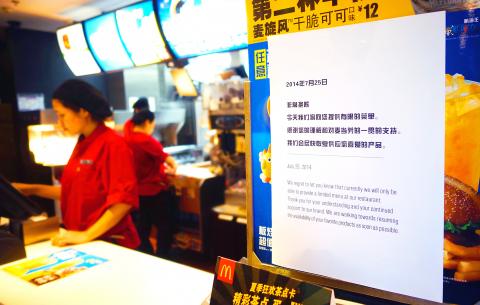An ongoing internal investigation conducted by OSI Group LLC into its unit, the scandal-hit Chinese food supplier Shanghai Husi Food Co (上海福喜食品), has revealed that standards were below par.
OSI Industries president and chief operation officer David McDonald told a news conference in Shanghai yesterday that the company would make “sweeping changes” to its China operations, including senior personnel changes.
The firm will also spend 10 million yuan (US$1.62 million) over three years to launch a food safety education program in Shanghai.

Photo: AFP
OSI Group, based in Aurora, Illinois, announced over the weekend that it was withdrawing all products made by the factory in Shanghai.
The factory’s customers in China included McDonald’s, KFC, Pizza Hut, coffee chain Starbucks, Burger King, 7-Eleven convenience stores and Papa John’s Pizza, the companies said.
An operator from the McDonald’s national delivery hotline yesterday said that beef and chicken items were unavailable in the Shanghai area, though fish and pork could be ordered.
“We have stopped selling all products related to Husi for food safety. Products affected mainly used beef and chicken,” he said.
At a McDonald’s in central Beijing, counter staff told customers that the branch only had the Filet-O-Fish sandwich.
At every cash register, there were signs in both Chinese and English reading: “We regret to let you know that currently we will only be able to provide a limited menu at our restaurant.”
It was unclear how wide the shortages are. By the end of April, McDonald’s had more than 2,000 restaurants in China, according to its Web site.
McDonald’s China could not be immediately reached for comment.
Just more than a week ago, authorities in Shanghai shut a plant owned by OSI Group for mixing out-of-date meat with fresh product and later detained five officials from Shanghai Husi.
The “bad meat” scandal, as it has been called by Chinese media, has spread to Japan and Hong Kong — a special administrative region of China.
McDonald’s said on Friday that its more than 3,000 restaurants in Japan had stopped selling products made with chicken from China, regardless of supplier. Japanese convenience store giant FamilyMart stopped selling chicken sourced from the Shanghai plant.
In Hong Kong, McDonald’s suspended sales of chicken nuggets and several other items, including chicken burgers, salads and lemon tea after admitting it imported food from the problem factory.

The US dollar was trading at NT$29.7 at 10am today on the Taipei Foreign Exchange, as the New Taiwan dollar gained NT$1.364 from the previous close last week. The NT dollar continued to rise today, after surging 3.07 percent on Friday. After opening at NT$30.91, the NT dollar gained more than NT$1 in just 15 minutes, briefly passing the NT$30 mark. Before the US Department of the Treasury's semi-annual currency report came out, expectations that the NT dollar would keep rising were already building. The NT dollar on Friday closed at NT$31.064, up by NT$0.953 — a 3.07 percent single-day gain. Today,

‘SHORT TERM’: The local currency would likely remain strong in the near term, driven by anticipated US trade pressure, capital inflows and expectations of a US Fed rate cut The US dollar is expected to fall below NT$30 in the near term, as traders anticipate increased pressure from Washington for Taiwan to allow the New Taiwan dollar to appreciate, Cathay United Bank (國泰世華銀行) chief economist Lin Chi-chao (林啟超) said. Following a sharp drop in the greenback against the NT dollar on Friday, Lin told the Central News Agency that the local currency is likely to remain strong in the short term, driven in part by market psychology surrounding anticipated US policy pressure. On Friday, the US dollar fell NT$0.953, or 3.07 percent, closing at NT$31.064 — its lowest level since Jan.

Hong Kong authorities ramped up sales of the local dollar as the greenback’s slide threatened the foreign-exchange peg. The Hong Kong Monetary Authority (HKMA) sold a record HK$60.5 billion (US$7.8 billion) of the city’s currency, according to an alert sent on its Bloomberg page yesterday in Asia, after it tested the upper end of its trading band. That added to the HK$56.1 billion of sales versus the greenback since Friday. The rapid intervention signals efforts from the city’s authorities to limit the local currency’s moves within its HK$7.75 to HK$7.85 per US dollar trading band. Heavy sales of the local dollar by

The Financial Supervisory Commission (FSC) yesterday met with some of the nation’s largest insurance companies as a skyrocketing New Taiwan dollar piles pressure on their hundreds of billions of dollars in US bond investments. The commission has asked some life insurance firms, among the biggest Asian holders of US debt, to discuss how the rapidly strengthening NT dollar has impacted their operations, people familiar with the matter said. The meeting took place as the NT dollar jumped as much as 5 percent yesterday, its biggest intraday gain in more than three decades. The local currency surged as exporters rushed to